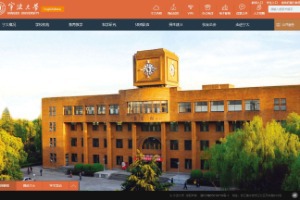Ningbo University

Ningbo University is a public university in Jiangbei District, Ningbo, Zhejiang Province, China.
The university's history is one of remarkable growth and transformation. Established in 1986, it began as a young institution with a clear vision of providing a comprehensive education. Its foundation was bolstered by generous donations from prominent figures, reflecting the strong support for educational advancement in the region. The early years saw the university forge valuable partnerships with established institutions like Zhejiang University and Fudan University. This collaboration ensured a high standard of education from the very beginning. A significant milestone arrived in 1996 with the merger of Ningbo Normal College and Zhejiang Fisheries College. This consolidation broadened the academic scope and solidified the university's position as a leading educational center. Subsequent mergers with Ningbo Maritime School, Ningbo Forestry School, and Ningbo Normal School further enriched the educational landscape, adding new disciplines and fostering a more diverse learning environment.
Campus life here is vibrant and multifaceted. Students can delve into their academic pursuits while also engaging in a plethora of extracurricular activities. From clubs and organizations to cultural events and sports teams, there's something for everyone. This enriching environment fosters personal growth and allows students to build lasting friendships. The university's motto aspires to not only equip students with academic expertise but also to cultivate critical thinking, leadership skills, and a global perspective. Looking forward, the university envisions itself at the forefront of academic innovation, contributing significantly to both local and global advancements. It aims to be a magnet for talented students and faculty, shaping future generations of leaders and fostering a spirit of lifelong learning.
University Profile
Get a quick snapshot of the university's key details.
| University Name | Ningbo University |
|---|---|
| Name in Local Language | 宁波大学 |
| Year Established | 1986 |
| Governing Type | Public |
| Student Body | Co-education |
| Highest Degree | Doctorate |
| Campus Type | Urban |
Location
The university is located in Ningbo, Zhejiang Province. Find the address and map of the university below.
| Address | 818 Fenghua Road, Jiangbei District, Ningbo, Zhejiang Province, China |
|---|---|
Contact
Connect with the university easily! Find their contact details.
| Phone | +86 (574) 8760 0963 |
|---|---|
| Fax | +86 (574) 8760 4338 |
| Website |

|
| Click here to send email | |
| More Links |
Admission Info
Admission to Ningbo University requires students to meet specific academic qualifications for the program they are applying to. For undergraduate programs, applicants must have completed secondary education and meet the university's entrance requirements, which may include an entrance examination or other qualifications. International students need to submit their academic transcripts, proof of language proficiency (in either English or Chinese, depending on the program), and may also be asked to provide additional documents such as recommendation letters. For graduate programs, applicants are required to hold an undergraduate degree and meet specific academic standards, including submission of a research proposal or personal statement. International graduate students may need to provide additional documentation, including proof of Chinese or English language proficiency.
| Accepts International Students | Yes |
|---|---|
| Undergraduate Admission Info | Click here |
| Graduate Admission Info | Click here |
| International Admission Info | Click here |
Scholarship and Financial Aids
Ningbo University offers a variety of scholarships for both domestic and international students. The university provides merit-based scholarships, financial aid for students from economically disadvantaged backgrounds, and government-funded scholarships for international students. One of the most prominent scholarships for international students is the Chinese Government Scholarship, which covers tuition fees, accommodation, and living expenses. Additionally, NBU offers other scholarships to encourage academic excellence and help ease the financial burden for students. The university also provides opportunities for work-study programs and research assistantships to further support students during their studies. These scholarships aim to make education at Ningbo University accessible to talented and deserving students from around the world.
Programs and Courses
Get a quick overview of programs and courses offered at this university.
| Bachelor's Degrees | Master's Degrees | Doctorate Degrees | Diplomas | |
|---|---|---|---|---|
| Arts & Humanities | n/a | n/a | ||
| Business & Social Sciences | n/a | |||
| Engineering | n/a | |||
| Language & Cultural Studies | n/a | n/a | n/a | |
| Medicine & Health | n/a | |||
| Science & Technology | n/a |
Click on the following button to explore a detailed list of programs and courses of this institute.
View Course ListRelated Articles
Stay informed with the following article related to the university or higher education in China.
